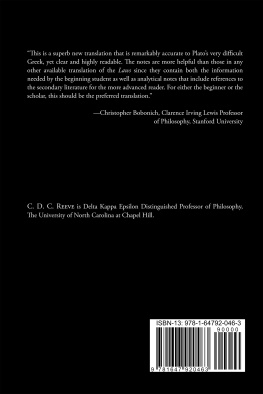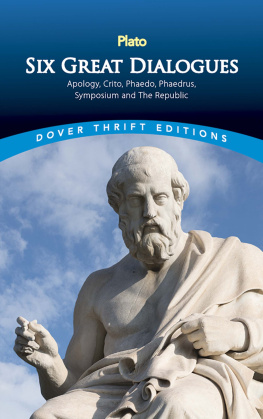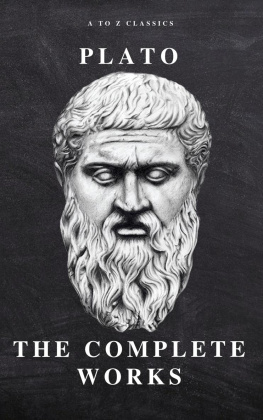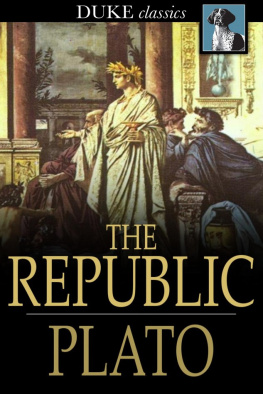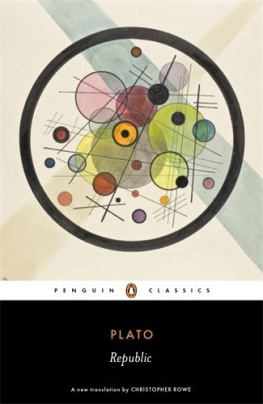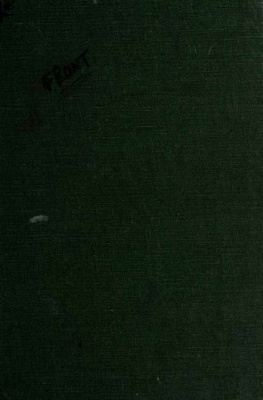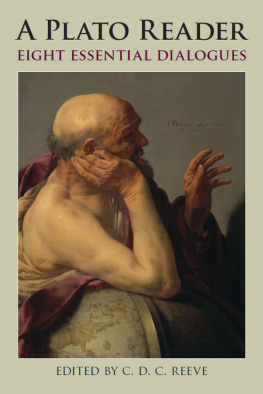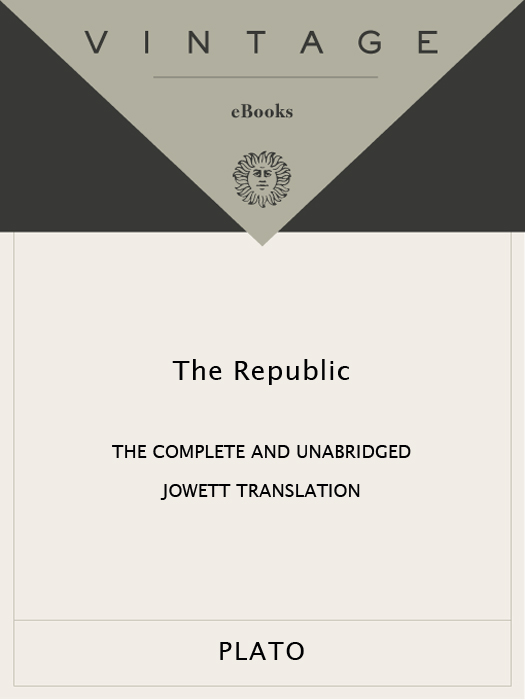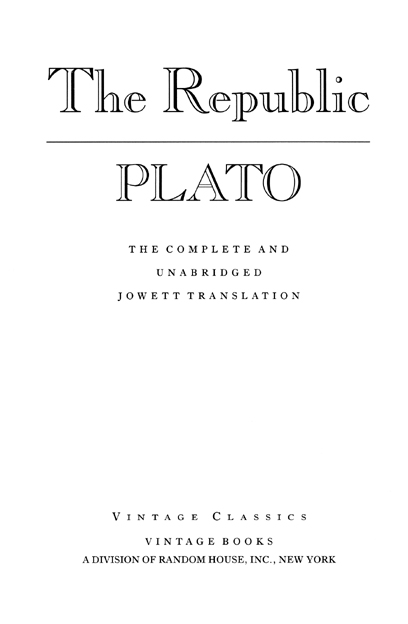V INTAGE C LASSICS E DITION , M ARCH 1991
Published in the United States by Vintage Books, a division of Random House, Inc., New York, and distributed in Canada by Random House of Canada Limited, Toronto.
Library of Congress Cataloging-in-Publication Data
Plato.
[Republic. English]
The Republic: the complete and unabridged
Jowett translation / Plato.
p. cm.(Vintage classics)
eISBN: 978-0-345-80369-6
1. Political scienceEarly works to 1800. 2. Utopias.
I. Jowett, Benjamin, 18171893. II. Title. III. Series.
JC71.P35 1991
321.07dc20 90-55688
CIP
v3.1
Contents
BOOK I
PERSONS OF THE DIALOGUE
| SOCRATES , who is the narrator | CEPHALUS |
| GLAUCON | THRASYMACHUS |
| ADEIMANTUS | CLEITOPHON |
| POLEMARCHUS |
And others who are mute auditors
T HE S CENE is laid in the house of Cephalus at the Piraeus; and the whole dialogue is narrated by Socrates the day after it actually took place to Timaeus, Hermocrates, Critias, and a nameless person, who are introduced in the Timaeus.
Steph. 327
SOCRATES, GLAUCON.
I WENT down yesterday to the Piraeus with Glaucon the son of Ariston, that I might offer up my prayers to the goddess
SOCRATES, POLEMARCHUS, GLAUCON, ADEIMANTUS.
I turned round, and asked him where his master was.
There he is, said the youth, coming after you, if you will only wait.
Certainly we will, said Glaucon; and in a few minutes Polemarchus appeared, and with him Adeimantus, Glaucons brother, Niceratus the son of Nicias, and several others who had been at the procession.
Polemarchus said to me: I perceive, Socrates, that you and your companion are already on your way to the city.
You are not far wrong, I said.
But do you see, he rejoined, how many we are?
Of course.
And are you stronger than all these? for if not, you will have to remain where you are.
May there not be the alternative, I said, that we may persuade you to let us go?
But can you persuade us, if we refuse to listen to you? he said.
Certainly not, replied Glaucon.
Then we are not going to listen; of that you may be assured.
Adeimantus added: Has no one told you of the torch-race on horseback in honour of the goddess which will take place in the evening?
With horses! I replied: That is a novelty. Will horsemen carry torches and pass them one to another during the race?
Yes, said Polemarchus, and not only so, but a festival will be celebrated at night, which you certainly ought to see. Let us rise soon after supper and see this festival; there will be a gathering of young men, and we will have a good talk. Stay then, and do not be perverse.
Glaueon said: I suppose, since you insist, that we must.
GLAUCON, CEPHALUS, SOCRATES.
Very good, I replied.
Accordingly we went with Polemarchus to his house; and there we found his brothers Lysias and Euthydemus, and with them Thrasymachus the Chalcedonian, Charmantides the Paeanian, and Cleitophon the son of Aristonymus. There too was Cephalus the father of Polemarchus, whom I had not seen for a long time, and I thought him very much aged. He was seated on a cushioned chair, and had a garland on his head, for he had been sacrificing in the court; and there were some other chairs in the room arranged in a semicircle, upon which we sat down by him. He saluted me eagerly, and then he said:
You dont come to see me, Socrates, as often as you ought: If I were still able to go and see you I would not ask you to come to me. But at my age I can hardly get to the city, and therefore you should come oftener to the Piraeus. For let me tell you, that the more the pleasures of the body fade away, the greater to me is the pleasure and charm of conversation. Do not then deny my request, but make our house your resort and keep company with these young men; we are old friends, and you will be quite at home with us.
I replied: There is nothing which for my part I like better, Cephalus, than conversing with aged men; for I regard them as travellers who have gone a journey which I too may have to go, and of whom I ought to enquire, whether the way is smooth and easy, or rugged and difficult. And this is a question which I should like to ask of you who have arrived at that time which the poets call the threshold of old ageIs life harder towards the end, or what report do you give of it?
CEPHALUS, SOCRATES.
I will tell you, Socrates, he said, what my own feeling Peace, he replied; most gladly have I escaped the thing of which you speak; I feel as if I had escaped from a mad and furious master. His words have often occurred to my mind since, and they seem as good to me now as at the time when he uttered them. For certainly old age has a great sense of calm and freedom; when the passions relax their hold, then, as Sophocles says, we are freed from the grasp not of one mad master only, but of many. The truth is, Socrates, that these regrets, and also the complaints about relations, are to be attributed to the same cause, which is not old age, but mens characters and tempers; for he who is of a calm and happy nature will hardly feel the pressure of age, but to him who is of an opposite disposition youth and age are equally a burden.
I listened in admiration, and wanting to draw him out, that he might go onYes, Cephalus, I said: but I rather suspect that people in general are not convinced by you when you speak thus; they think that old age sits lightly upon you, not because of your happy disposition, but because you are rich,
CEPHALUS, SOCRATES.
You are right, he replied; they are not convinced: and there is something in what they say; not, however, so much as they imagine. I might answer them as Themistocles answered the Seriphian who was abusing him and saying that he was famous, not for his own merits but because he was an Athenian: If you had been a native of my country or I of yours, neither of us would have been famous. And to those who are not rich and are impatient of old age, the same reply may be made; for to the good poor man old age cannot be a light burden, nor can a bad rich man ever have peace with himself.
May I ask, Cephalus, whether your fortune was for the most part inherited or acquired by you?
Acquired! Socrates; do you want to know how much I acquired? In the art of making money I have been midway between my father and grandfather: for my grandfather, whose name I bear, doubled and trebled the value of his patrimony, that which he inherited being much what I possess now; but my father Lysanias reduced the property below what it is at present: and I shall be satisfied if I leave to these my sons not less but a little more than I received.
That was why I asked you the question, I replied, because I see that you are indifferent about money, which is a characteristic rather of those who have inherited their fortunes than of those who have acquired them, the makers of fortunes have a second love of money as a creation of their own, resembling the affection of authors for their own poems, or of parents for their children, besides that natural love of it for the sake of use and profit which is common to them and all men. And hence they are very bad company, for they can talk about nothing but the praises of wealth.


